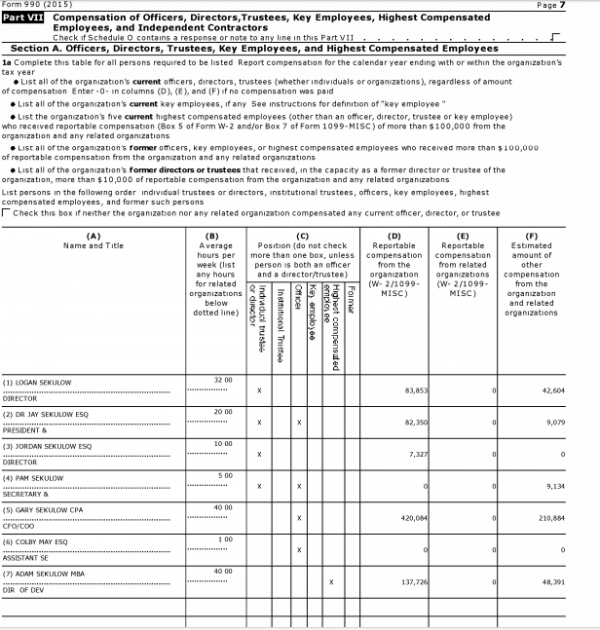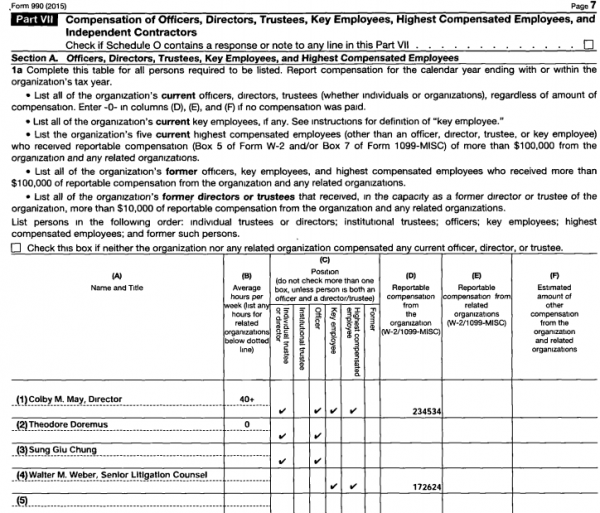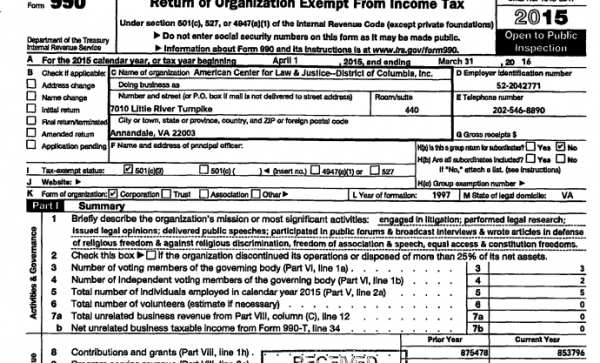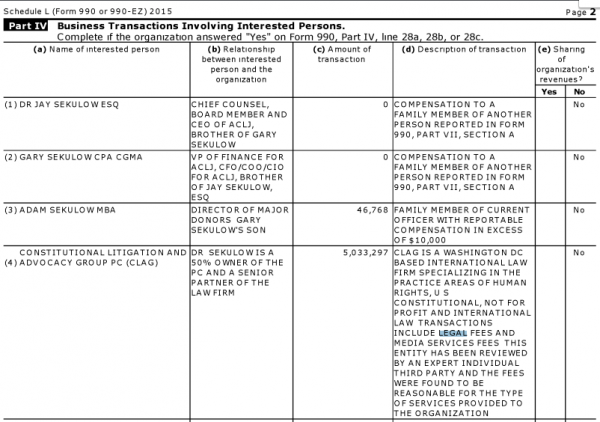The UK Guardian reported yesterday that two state AG’s (NY and NC) will look into the finances of Trump lawyer Jay Sekulow and his fundraising charities. Examining the federal tax forms from Christian Advocates Serving Evangelism (2015 990), I can see why. Remember CASE is the nonprofit which serves as the fundraising organization for Sekulow’s American Center for Law and Justice, supposedly a religious liberty law firm.
According to the IRS, family relationship on the board of a nonprofit raise a red flag:
Irrespective of size, a governing board should include independent members and should not be dominated by employees or others who are not, by their very nature, independent individuals because of family or business relationships. The Internal Revenue Service reviews the board composition of charities to determine whether the board represents a broad public interest, and to identify the potential for insider transactions that could result in misuse of charitable assets.
It seems obvious that a nonprofit should not be organized like a closely held family company. Now look at the board of Sekulow’s CASE:

Perhaps the name of the organization should be changed to Christian Advocates Serving Sekulows.
The only person on the board who is not named Sekulow is Colby May. However, he cannot be considered an independent board member because his income is dependent on grant money received from CASE/ACLJ. May runs the ACLJ’s DC affiliate which is completely funded by CASE/ACLJ. A review of ACLJ-DC’s 990 form shows May as the Director.

ACLJ-DC’s income was reported on the 2015 990 as $853,796.

As can be seen on ACLJ’s 2015 990, a grant of the exact same amount was given to ACLJ-DC.

I suspect CASE might have to provide more information to the AGs about how executive compensation was decided since none of the board members can be considered independent. Again, the IRS guidelines specify independence in setting compensation.
The Internal Revenue Service encourages a charity to rely on the rebuttable presumption test of section 4958 of the Internal Revenue Code and Treasury Regulation section 53.4958-6 when determining compensation of its executives. Under this test, compensation payments are presumed to be reasonable if the compensation arrangement is approved in advance by an authorized body composed entirely of individuals who do not have a conflict of interest with respect to the arrangement, the authorized body obtained and relied upon appropriate data as to comparability prior to making its determination, and the authorized body adequately documented the basis for its determination concurrently with making the determination.
The CASE/ACLJ 990 form indicates the Sekulows and CASE/ACLJ engaged in four sizable mutual transactions as well as a major one involving a company half-owned by Jay Sekulow. See below:

Given the fact that none of the board members can be considered independent, how could this board prevent conflicts of interest as defined by the IRS?
B. Conflicts of interest. The directors of a charity owe it a duty of loyalty. The duty of loyalty requires a director to act in the interest of the charity rather than in the personal interest of the director or some other person or organization. In particular, the duty of loyalty requires a director to avoid conflicts of interest that are detrimental to the charity. Many charities have adopted a written conflict of interest policy to address potential conflicts of interest involving their directors, trustees, officers, and other employees. The Internal Revenue Service encourages a charity’s board of directors to adopt and regularly evaluate a written conflict of interest policy that requires directors and staff to act solely in the interests of the charity without regard for personal interests; includes written procedures for determining whether a relationship, financial interest, or business affiliation results in a conflict of interest; and prescribes a course of action in the event a conflict of interest is identified.
According to the 990, a third party expert reviewed the 5-million payment to Sekulow’s law firm and said it was all fine. I hope the AGs get to interview that third party. In the spirit of transparency, I call on Sekulow and company to disclose the identity of the expert and the basis on which the transaction is reasonable.
I hope the attention Sekulow is now getting will shine a light on the disgusting fund raising practices too many Christian charities use. Many such charities flaunt the very values and beliefs they claim to be upholding.